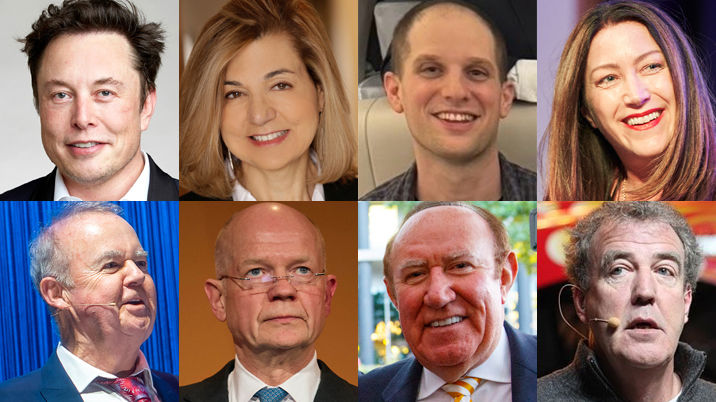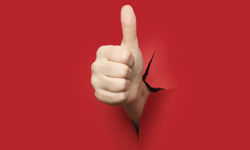
US election
Elon Musk: “For anyone, whether in America or other countries, who finds this result shocking, they should reconsider where they get their information. This trend was obvious on X for months, but almost all the legacy mainstream media pushed a completely false reality. They lied to you.”
Musk to his 200 million followers on X: “You are the media now.”
Donald Trump speaking at a rally in Pennsylvania: “I have a piece of glass over here, and I don’t have a piece of glass there. And I have this piece of glass here, but all we have really over here is the fake news, right? And to get me somebody would have to shoot through the fake news. And I don’t mind that so much.”
Margaret Sullivan, Guardian US columnist: “Donald Trump poses a clear threat to journalists, to news organisations and to press freedom in the US and around the world. Trust in the media may be low, and American citizens may not be fans of journalists or their work. But they ought to know that just as longstanding reproductive rights have collapsed in recent years, press rights — already reeling — could suffer the same fate.”
Former Washington Post executive editor Marty Baron on X after the paper decided not to endorse a presidential candidate: “This is cowardice, with democracy as its casualty. @realdonaldtrump will see this as an invitation to further intimidate owner @jeffbezos (and others). Disturbing spinelessness at an institution famed for courage.”
David Yelland on X: “Donald Trump is a corrupter, he is corrupting media commentators right now, in real time, I can see it, you can see it, they know it, columnists, editors, presenters... they are morphing their own politics to win favour... This is how it works.”
Elon Musk
Daily Mail in a leader after riots in the UK: “Instead of acting to remove inflammatory material from his social media site, Elon Musk seems determined to add to it. Not content with giving a platform to the likes of English Defence League founder Tommy Robinson, the Twitter/X owner now informs his 192 million followers that Britain is sliding towards an ‘inevitable’ civil war. It is wildly irresponsible, patently untrue, and only serves to feed the belligerent fantasies of Robinson and his far-Right cronies. Mr Musk should be ashamed.”
Alan Rusbridger in Prospect magazine: “Musk has appointed himself the arbiter of free speech for 350m or more people. He professes a child-like belief that truth will somehow win through in the chaotic space that he has enabled. He has an almost obsessional disgust for all mainstream media.”
Jonathan Dimbleby on X: “I post infrequently and this is my last. Musk’s toy has been colonised by narcissists, the brain-dead and advertisements. I shall nonetheless miss the ‘wit and wisdom’ of the best among whom I have friends. The latter I shall still see. To the rest, goodbye. Life is too short.”
UK General Election
Sir Kier Starmer in an article for the News Media Association: “I fought tooth and nail for the honour of serving our country as prime minister. And at every step of the way, I was robustly held to account by determined, incisive and irrepressible members of the fourth estate. Neither myself nor the now leader of the opposition complained about this. Neither of us turned our partisan supporters against the media.”
John Ryley, former editor in chief of Sky News, in the British Journalism Review, on TV coverage of the General Election: “This soggy announcement outside Downing Street was the first in a series of spectacular own goals by the Conservatives. Television news rightly focused on the government’s mistakes but at the expense of sufficient scrutiny of Labour’s policies, Sir Keir Starmer’s leadership and the views of his shadow cabinet. The Tory errors sucked the journalism out of the campaign. Labour had it easy.”
Kelvin MacKenzie on X: “Totally risible in the Sun’s endorsement of Starmer is the claim that it has always been ‘their commitment to hold the government’s feet to the fire’. The reality is that if you, as an editor, went off piste and attacked a PM Murdoch had endorsed you could collect your P45 that evening.”
Freedom
IFJ general secretary Anthony Bellanger: “The attempted prosecution of Julian Assange cast a dark shadow over journalists, particularly those who cover national security issues. Had Assange gone to prison for the rest of his life, any reporter handed a classified document would fear facing a similar fate.”
Wall Street Journal reporter Evan Gershkovich after being freed from a Russian jail in a prisoner swap: “It was great to get on that bus today and see not just Americans and Germans but Russian political prisoners. I spent a month in prison in Yekaterinburg where everyone I sat with was a political prisoner. Nobody knows them publicly, they have various political beliefs, they are not all connected with Navalny supporters, who everyone knows about. I would potentially like to see if we could do something about them as well.”
For sale
Spectator editor Fraser Nelson, shortly before he was replaced by Michael Gove, on the sale of the magazine for £100 million to financier Sir Paul Marshall: “This deal is vindication of The Spectator’s unusual business model. In this trade, there is always pressure to go for the digital ‘quick wins’ (clickbait articles, advertorials, etc) but we rejected this as a false economy — so commercial that it’s uncommercial. It would take us downmarket, deform our character and, ergo, reduce the company’s value. So we went the other way, using our success to double down on the magazine’s finest traditions in the belief that quality of writing matters above all.”
Leading cultural figures in a letter to Press Gazette on the proposed sale of the Observer: “The news that the Guardian chief executive and editor-in-chief are actively considering a takeover of the Observer by Tortoise has left us shocked and dismayed. While Tortoise is a respected media outlet, we believe that the move would be disastrous for the world’s oldest Sunday newspaper and its journalists, for the Guardian and for liberal journalism.”
Huw Edwards
BBC chair Samir Shah: “On the face of it, he was a much-admired broadcaster with whom the BBC had entrusted the responsibility of anchoring its flagship news programme and presiding over national events but he betrayed the trust of staff and our audiences in the most egregious possible way. Let me be clear: the villain of this piece is Huw Edwards; the victims are those children for whose degradation Huw Edwards provided a market for.”
Victoria Newton on the Sun’s exclusive reporting: “There was a young person at the heart of this who was in a desperate situation, highly vulnerable, and the parents felt they had nowhere else to go. They’d gone to the BBC, they talked to the police, and they got nowhere, and they just wanted the payments to stop. So that’s why they came to us in desperation.”
Post Office Scandal
Private Eye editor Ian Hislop on the Post Office scandal, speaking on BBC Radio 4’s The Media Show: “People ask the question ‘why did it take an ITV drama?’ I am saying, ‘Good, good for ITV drama. That’s what good drama does.’ Without the journalism there would be no drama. The facts and the detail come from decades of very, very effective journalism by a very few people.”
Local press
William Hague in The Times: “In most of Britain, local news is hollowed out and on the verge of extinction. Do we just have to shrug our shoulders? Is it just another case, like video rental stores or shops that develop your holiday photos, where new technology takes over? There is a big difference. Those businesses were replaced by new services, such as streaming and digital photos, which provide a superior product. Local papers are not being replaced by anything remotely equal, let alone superior, and that is a market failure that needs correction.”
Press Gazette: “In the mid-2000s, then local press trade body the Newspaper Society reckoned local newspapers employed around 13,000 journalists. Our analysis suggests that figure is now likely around the 4,000 mark. The decline of the UK regional press has been inversely proportional to the rise of US tech giants operating in the UK media market.”
Gaza
Sherif Mansour, the Committee to Protect Journalists’ Middle East and North Africa programme coordinator: “Journalists across the region are making great sacrifices to cover this heart-breaking conflict. Those in Gaza, in particular, have paid, and continue to pay, an unprecedented toll and face exponential threats. Many have lost colleagues, families, and media facilities, and have fled seeking safety when there is no safe haven or exit.”
Bad relations
Andrew Neil asked by a Lords committee how government should help journalists: “Stay the hell out of it... You’re not on our side, we’re not on your side. We’re different. Relations between journalists — all media — and government should always be bad. And never, on any account, allowed to get better.”
Newsprint
Jeremy Clarkson in the Sunday Times: “I love newspapers, and not just because I’ve made a living from them for 46 years. I love the sound they make when they come through the letterbox. I love the feel of the newsprint and the sheer amount of information you’re given every day. What else, for a few quid, can make you laugh, cry, sob and be frozen by rage? In the space of an hour?”
Rupert Murdoch on SKY News Australia predicting that “with luck” the last physical newspaper will be printed in 15 years: “You get on a train... you see anyone with a paper? You see no one. Now they’re reading all the facts on their phones.”
Picture credits: Elon Musk (The Royal Society, CC BY-SA 3.0, via Wikimedia Commons), Margaret Sullivan (Michaelbenabib, CC BY-SA 4.0, via Wikimedia Commons), Victoria Newton (Newsworks), Ian Hislop (Raph_PH, CC BY 2.0, via Wikimedia Commons), William Hague (Foreign, Commonwealth & Development Office, CC BY 2.0, via Wikimedia Commons), Andrew Neil (Financial Times, CC BY 2.0, via Wikimedia Commons), Jeremy Clarkson (Petr Magera, CC BY 2.0, via Wikimedia Commons).
This article was first published in InPublishing magazine. If you would like to be added to the free mailing list to receive the magazine, please register here.












